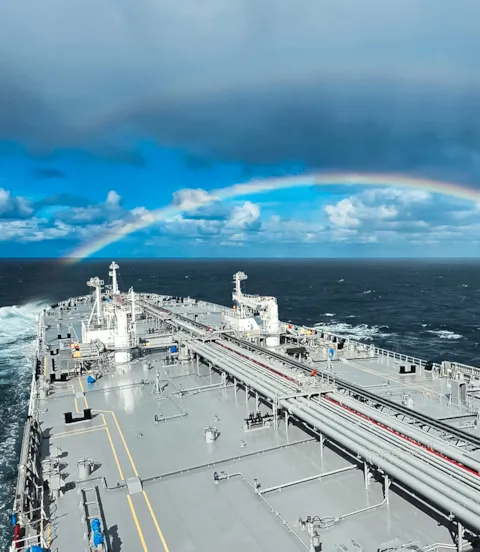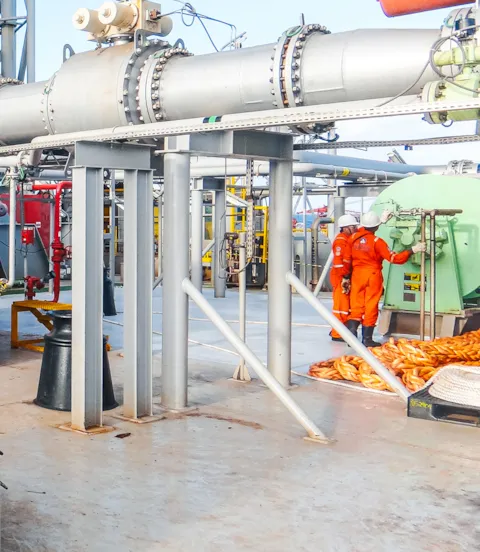Atlas Maritime leverages DNV service to verify cargo discharge savings
As an energy-intensive process, cargo discharge operations are under scrutiny as tanker operators strive to minimize emissions and fuel costs. A new operational data-driven service developed by DNV sheds light on the relevant parameters, enabling operators to optimize operations based on solid data.
The optimization of cargo discharge operations (CDO) is a digital service developed by DNV to help tanker operators realize fuel and cost-saving potential when discharging cargo at terminals or ship-to-ship. Neglected in the past, when bunkering was inexpensive and carbon intensity was not a concern, this process is attracting more attention today. The need to comply with carbon emission limits and minimize related costs has prompted the industry to take a hard look at every process on board.
What sets this service apart is its foundation in the analysis of operational data and its ability to reflect the real-world complexity of onboard roles. This approach not only supports more accurate decision making but also helps build trust among stakeholders by verifying process performance and realizing optimization potential aligned with actual practices.
Energy-saving strategies for cargo discharge process
Discharging crude oil in port is an energy-intensive, safety-critical and complex process. Most tanker vessels use Rankine cycle steam turbine-driven cargo pumps, making CDO a low-efficiency process shaped by multiple interdependent crew roles across the vessel. Its performance depends on close coordination between bridge, cargo control, and engine room teams, making it a highly fragmented and crew-driven operation.
Cargo discharge operations must be coordinated and monitored carefully in response to the instructions received from the terminal. Cargo pump room crew operate the pumps under the chief officer’s guidance, while the engine room team manages boiler and inert gas systems to meet steam and safety needs. Significant amounts of boiler fuel can be saved if the crew have a clear understanding of how its handling of the equipment influences energy consumption.
Data-driven, actionable insights reduce fuel use during discharge
Recognizing that a methodical approach is needed to manage the cargo discharge process as economically as possible, DNV developed its CDO service, which relies on an innovative framework for data-driven optimization of discharge operations. Based on a modular and reconfigurable digital twin of the vessel’s discharge systems, the CDO service utilizes actual vessel data streams to evaluate energy flows, fuel consumption, and system performance under varying operational conditions. The aim is to enhance operational robustness, increase energy awareness on board, and enable tangible reductions in fuel use and emissions during cargo discharge.
“The purpose of our service is for every discharge operation to run at optimized parameters, and to benchmark and verify the performance,” explains Chara Georgopoulou, PhD, Principal Engineer and Head of Maritime R&D and Advisory at DNV Greece. “Based on the data collected, we define a theoretical optimum as a benchmark for the given operation. While final decisions remain with the crew, the service offers valuable guidance and continuous training to improve operational efficiency and reduce fuel use.”

How Atlas Maritime earns charterer trust through efficient discharge
“During cargo discharge operations, a substantial proportion of the vessel’s machinery and equipment is in operation,” explains Chris Ioannou, Technical Manager at Atlas Maritime, a Greek company operating a fleet of state-of-the-art Aframax and LR2 crude oil tankers. “All diesel generators, boilers, pumps, and a large part of the crew are fully engaged. This is precisely why cargo owners – major oil companies chartering tankers – deploy vetting surveyors to audit vessels specifically during these operations.”
For Atlas Maritime, a disciplined approach to the cargo discharge process has become a clear competitive advantage. Charterers highly value the company’s attention to detail, which helps minimize fuel consumption and emissions while maintaining high safety standards during cargo transfer from ship to shore. “We continuously evaluate each of our vessel’s operational performance, and that level of commitment is something charterers truly appreciate,” adds Ioannou.

Empowered crews optimize cargo discharge
Achieving the right level of control and efficiency is anything but easy. When Atlas Maritime first heard about DNV’s CDO service, it seemed like a perfect fit. “Atlas Maritime has been one of the companies where everyone, from the top level down, was paying close attention to every operational aspect,” notes Georgopoulou.
Some 15 months after first booking the CDO service, Technical Manager Ioannou can now say: “Our crew understood from the outset that nothing is achieved by chance – there is a specific, structured way of doing things. They are the ones inputting the reports, so they clearly see how their actions impact the system. When something needs attention, we provide feedback, which helps close the loop. At the same time, we remain flexible. We’re currently in discussions with the organization to explore how additional factors might be influencing the results. This will help us improve even further and strengthen our appeal to top-tier charterers, who are highly selective in their vessel choices.”

Learning from every discharge: Refining performance with CDO
CDO has not only become key to coordinating everyone on board during cargo discharge operations but has also started a continuous learning process, says Ioannou. “Our teams document every interaction with the terminal – whether it’s a stoppage or an important exchange of information, so that DNV can gain insight beyond just the raw data,” Ioannou explains. “We also instruct our crew to take pictures as evidence, such as instrument readings and other operational details. Everything is thoroughly recorded and documented. The DNV system helps us identify any leaks or weak points, which we can then address and improve. It also provides a valuable opportunity to view the entire operation holistically. Based on what we learn about optimal parameters in specific scenarios, we continuously develop new, meaningful KPIs to drive further improvement.”
But Atlas Maritime and its ship crews are not the only ones learning. “There are many ways to utilize the results,” Chara Georgopoulou points out. “We not only provide verification of performance and results that deliver real practical value; these results also bring us to the next stage to achieve design improvements of our service.” While CDO is an offline service for the time being, DNV is actively working on developing a fully software-based online offer.

Fleet-wide monitoring multiplies the savings benefits
For Atlas vessels that are identical by design, the company can easily cross-reference observations and apply insights across the fleet. “We establish KPIs based on CDO results and track how each vessel performs by monitoring differences among sister ships,” says Ioannou. “Any observation made on one vessel is typically relevant to the others – unless it’s specific to the human factor or the terminal characteristics.” This approach, he notes, allows the collaboration with DNV to go beyond individual ships, opening up valuable opportunities for deeper discussions with DNV’s experts on how to drive continuous improvement across the fleet.

CDO insights influence future ship designs
“We pay close attention to every detail, and tools like CDO help us continuously identify areas for improvement,” Ioannou continues. “This insight goes beyond day-to-day operations; it directly contributes to updates of the design of our future vessels. The CDO service not only enables us to maintain consistently high operational performance but also guides us in defining the most effective technical specifications. This ensures that our newbuilds are not only optimized for efficiency and reliability but also designed with enhanced operational resilience. In that sense, CDO is not just a performance tool, it’s a strategic asset.”
- Atlas Maritime
- DNV
